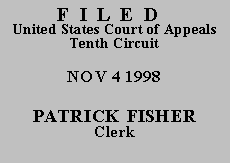

| CHRIS E. COLUMBUS, |
|
This matter arose out of Mr. Columbus's failure to file income tax returns for 1992, 1993 and 1994. The Commissioner determined through an audit that Mr. Columbus had unreported taxable income for those years. The Commissioner also determined that Mr. Columbus was liable for additions to tax under I.R.C. §§ 6651 and 6654 for failure to file a tax return and the underpayment of estimated tax. The Commissioner issued a notice of deficiency to Mr. Columbus, who petitioned the Tax Court to redetermine the deficiency.
After a trial, the Tax Court upheld the Commissioner's determinations on all counts but one. The court held that, for 1992-1994: (1) Mr. Columbus was not entitled to married filing joint return status, (2) Mr. Columbus was not entitled to a dependency exemption for his oldest daughter Angie, (3) Mr. Columbus was not entitled to damages under I.R.C. § 7214 for amounts California garnished from his wages for child support, and (4) the Commissioner properly applied additions to tax for failure to file returns and failure to pay estimated tax. Mr. Columbus appeals these findings. We review the Tax Court's findings on legal issues de novo and factual issues for clear error. See Schelble v. Commissioner, 130 F.3d 1388, 1391 (10th Cir. 1997).
Mr. Columbus was not eligible for married filing joint return status because he did not file a joint tax return with his wife. The Internal Revenue Code requires married individuals to file a joint tax return to obtain the special tax rates for married couples. See I.R.C. § 1(a). Mr. Columbus, by not filing a tax return for 1992, 1993 or 1994, did not make the required election necessary to obtain married filing joint return status. See Sloan v. Commissioner, 102 T.C. 137, 141 (1994). In addition, Mr. Columbus can no longer retroactively claim joint return status because he did not file a return as of the date this case was submitted for decision in the Tax Court. See Brattin v. Commissioner, 64 T.C.M. 1144, 1145 (1992). Therefore, the Tax Court's determination was proper.
Mr. Columbus was not entitled to a dependency exemption for his daughter Angie because he has not introduced any evidence that Angie was a "dependent." Angie would be considered a dependent if Mr. Columbus could show that: (1) she was under age 19, (2) she was a full time student under age 24 (3) her gross income was less than the exemption amount of $2,000 or (4) Mr. Columbus provided more than half of Angie's support during the year. See I.R.C. §§ 151(c)(1), 152(d)(2). Mr. Columbus did not introduce any evidence that Angie would qualify as a "dependent" under I.R.C. §§ 151 and 152. Therefore, he has not met his burden of proving his entitlement to a dependency exemption for Angie. See Zell v. Commissioner, 763 F.2d 1139, 1141 (10th Cir. 1985).
Mr. Columbus is not entitled to damages from the Internal Revenue Service under I.R.C. § 7214 for remitting his 1991 income tax refund to California as payment for past child support. Section 7214 is a criminal statute over which the Tax Court lacks jurisdiction. See I.R.C. § 7214; Hester v. Commissioner, 64 T.C.M. 802, 806 (1992). In addition, I.R.C. § 6402(c) provides for the reduction of an overpayment of taxes by the amount of past-due child support; the Tax Court does not have jurisdiction to review or restrain a reduction authorized by section 6402(c). See I.R.C. § 6402(e). Therefore, the Tax Court properly held that it lacked jurisdiction over Mr. Columbus's claim for damages.
Finally, the Tax Court properly upheld additions to tax under I.R.C. §§ 6651 and 6654 for failure to file timely tax returns and for failure to pay estimated tax. See I.R.C. §§ 6651, 6654. Mr. Columbus has not shown that his failure to file a timely return or pay estimated taxes was due to "reasonable cause" as required by the statutes. Id. His testimony demonstrates that he did not file his returns because he did not know whether to report his daughter as a dependent as well as to "call attention" to himself. The Tax Court did not err in finding that Mr. Columbus had not established reasonable cause for failure to file returns or pay estimated tax.
AFFIRMED.
Entered for the Court
Paul J. Kelly, Jr.
Circuit Judge
*. This order and judgment is not binding precedent, except under the doctrines of law of the case, res judicata, and collateral estoppel. This court generally disfavors the citation of orders and judgments; nevertheless, an order and judgment may be cited under the terms and conditions of 10th Cir. R. 36.3.
**. After examining the briefs and the appellate record, this three-judge panel has determined unanimously that oral argument would not be of material assistance in the determination of this appeal. See Fed. R. App. P. 34(a); 10th Cir. R. 34.1.9. The cause is therefore ordered submitted without oral argument.